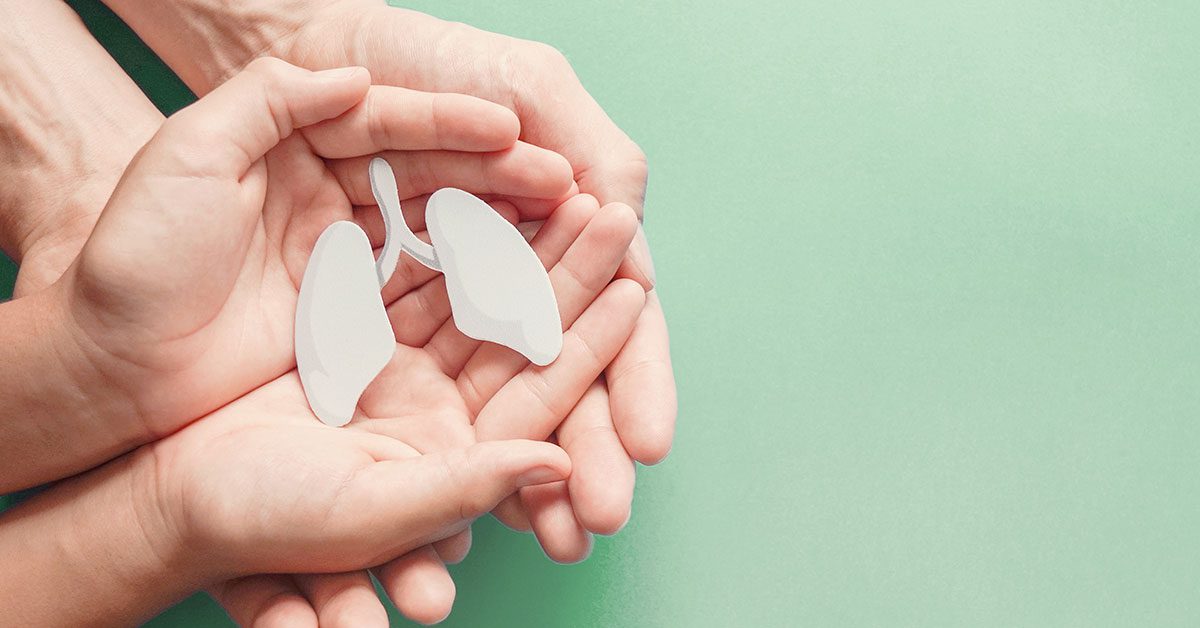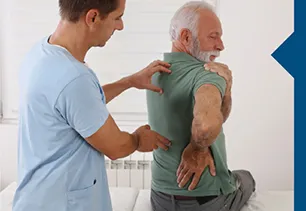Living with chronic obstructive pulmonary disease (COPD) can mean facing changes in ability to perform daily activities. Managing shortness of breath and fatigue from simple tasks like getting dressed is a reality for many. You might also find your mental health affected by your diagnosis. There is a wide range of support to help ease the stress and worry in your life, including Pulmonary rehabilitation.
How COPD Affects Daily Living
For people living with COPD, the most common symptom is shortness of breath with activity and even at rest.
Other symptoms include:
- Increased fatigue
- Weight loss
- Decreased strength
- Coughing
- Anxiety and depression
Your quality of life does not have to suffer because of COPD. Understanding what causes an exacerbation or flare up will help you with your ability to manage your COPD.
Factors can make symptoms worse:
- Stress and anxiety can manifest in physical ways. Panic attacks can cause irregular breathing or hyperventilation.
- Environmental factors such as extreme cold or heat can trigger a flare up or exacerbation. Humidity and the quality of air both inside and outside can also irritate the lungs.
- Not having the right medications or forgetting to take your medication consistently can lead to exacerbations.
- Tobacco use or Vaping cause additional damage to your lungs and pulmonary system and can trigger an exacerbation.
Modifying Daily Activities
Modifications to your daily activities have likely been necessary. Below are subtle ways you can pace your activities and conserve your energy.
- Group small daily tasks together. Morning hygiene is usually a group of small activities done first thing in the morning. You can group other small daily tasks as well.
- Create check lists for tasks to help organize your day and to help you remember important things like taking your medications, changing or filling (recharging) your oxygen tank, or performing breathing exercises.
- Prep for your meals once a day, or prepare a week of meals at the beginning of the week. Do your meal prep seated when possible. Meal prepping also helps you stick with a healthy diet. Focus on high lean protein, low fat foods similar to the Mediterranean diet. Keep meals small, eating 4-5 small meals, spaced out through the day. Large, heavier meals place pressure on your diaphragm and can make breathing more difficult.
- Be patient and give yourself additional time. Break up strenuous activities into smaller tasks in order to conserve energy. When you take your time, instead of pushing through to complete a chore quickly, you will remain in better control of your breathing may have more energy later for the things you enjoy.
- Set goals. Try drinking at least 64 ounces of water a day. Once you’ve met this goal, you can try for 70 ounces. Being hydrated can improve your mood and achieving goals can motivate you to make and achieve more goals.
COPD Exercise & Activity Guidelines
Exercise each day to maintain strength and stamina. Know your limits and work within them regularly. Don’t let fear stop you from working on your exercise capacity. Though it will not reverse the effects of COPD, regular exercise will reduce the symptoms of COPD such as anxiety and depression and will help you be independent longer.
Beneficial types of Exercise
- Stretching and flexibility exercises like yoga can help keep your muscles active while creating minimal stress on your breathing.
- Aerobic exercise like walking, swimming or stationary cycling are great options for boosting the amount of oxygen in your system
- Resistance exercises with bands or weights are great exercises for maintaining muscle mass.
- When exercising, incorporate pursed lip breathing. Inhale through your nose for two seconds, then purse your lips and exhale as if you’re blowing bubbles or blowing out your birthday candles for 5 seconds.
COPD Help & Support
Medications and use of equipment are more ways to boost your quality of life.
Medications, Equipment and Action Plans
- Take your respiratory medications as prescribed, especially your daily preventative medications (Advair, Breo, Dulera, Trelegy, Symbicort and many others)
- Use your supplemental oxygen as prescribed. Do not increase or decrease your flow or usage unless advised by your healthcare provider.
- Follow the manufacturers guide to cleaning your respiratory equipment regularly.
- Work with your doctors and therapist to ensure you are using inhalers properly.
- Use a spacer for your rescue medication inhalers. Spacers suspend medication in a tube before inhaling. This increases the amount of medication delivered to your lungs and less is lost spraying the inside of your mouth. Ask your healthcare provider for a spacer prescription if you do not have one.
- There are also many changes you can make to your daily medication regime to keep exacerbations at bay. So, keeping a dialogue with your healthcare team is important.
- Develop an “Action Plan” with your healthcare provider. If you have difficulty remembering what to do, ask your provider to print a copy and keep it where you can access it easily. If you are on constant supplemental oxygen, keep a copy of your Action Plan on or inside your tank carrier. Refer to and follow your plan whenever it’s needed.
Adaptive Equipment
In many cases of mild and severe COPD, many activities are limited without additional support. Adaptive equipment can help you with independent tasks.
- Add more chairs and stools around the house so you can sit while performing daily tasks like cooking, getting dressed, and even showering.
- Use an extended grabbing tool to avoid bending down to pick things up or to keep you from having to climb to reach something up high.
- Rolling walkers often double as a portable seat and many can be fitted with bags and baskets to carry important equipment like oxygen. These devices improve mobility and promote continued mobility in people with severe COPD.
- A “pulse ox” or small blood oxygen sensor is a small device you can fit in your pocket. When clipped to your finger, nose, ear or toe, it reads your heart rate and the percentage of oxygen saturation in your blood. This device can let you know when and if you need to use your oxygen.
- Motorized Scooters allow you to travel long distances not accessible by car. Going through each isle of the grocery store or even taking a trip to the zoo become possible.
Activity Intolerance Related to COPD
People live many years with their COPD, but severe cases can limit your ability to complete some activities of daily living. You have many options for continuing a full life while managing your COPD at any stage.
COPD Caregiver Support
There may come a point where managing your COPD alone is difficult. Often, family and friends step up to offer support. Having a caregiver to support or someone else involved in your healthcare to get you to and from your appointments, ensure you’re taking your medications at the right times and dosages, and generally being another set of hands around the house is important.
How to Improve Quality of Life Through Pulmonary Therapy
Continuing pulmonary therapy throughout all stages of COPD is important. Whether you conduct therapy virtually with a provider, or go into the office, the support of your medical team can help you effectively manage your symptoms and maintain your quality of life.
Remember, there is also support for your mental health. Attending pulmonary therapy or COPD support groups in your area can help you feel less isolated and provide you with comradery. If you have difficulty getting to group meetings, choose an online option or a social media group.
Do you have lung disease or difficulty breathing? Shortness of breath starts a downward spiral of inactivity, deconditioning, disability and social isolation. Lifeline Therapy and Pulmonary Rehabilitation can help you breathe better, move easier, and enjoy a better quality of life.
Join our 12 week multidisciplinary pulmonary rehabilitation program. We focus on disease management and education. Individualized exercises are prescribed to improve strength, posture, balance and functional mobility. Our focus is helping you achieve your personal goals. Contact Lifeline Therapy today to start your personal independence program!
Resources:
COPD Pocket Consultant Guide App available for Apple and Android
The app will help you keep track of activities, medications and will help guide your next conversation with your healthcare provider.
The COPD Foundation
copdfoundation.org

